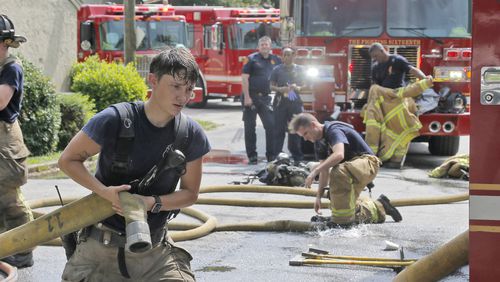DeKalb County commissioners are trying to convince city leaders to help pay for replacing old, worn-down fire stations.
Commissioners said during a meeting Friday they want the fire station funding to come from a proposed sales tax increase that would primarily go toward road repaving. But at least a couple of city governments oppose the idea, said Commissioner Nancy Jester, who represents north DeKalb.
The DeKalb Fire Department requested $56 million to replace seven fire stations, repair 20 stations, build three new stations, replace portable radios, deploy quick response units and plan for a public safety training center. The funding could come from nearly $500 million that would be raised over the next five years if voters approve the special purpose local option sales tax (SPLOST) in November.
Jester said the cities would be better off contributing money for fire stations from their share of the proposed sales tax hike, from 7 percent to 8 percent. If the cities don’t agree, some county commissioners said they’d consider raising property taxes to fund replacement fire stations.
“I don’t think the case has been made to them (city government leaders) numerically how it is better,” to fund fire station improvements through sales taxes rather than property taxes, Jester said. “If you just did a SPLOST and did it that way, everybody’s better off financially.”
Commissioner Jeff Rader said fire protection is a shared countywide resource. City governments, which would receive a population-based portion of sales tax funds, should contribute to repairing the county’s fire department infrastructure, he said.
"We should have a uniform per capita allocation," said Rader, who represents a west-central DeKalb district that covers parts of Brookhaven, Druid Hills, Emory University and Decatur.
The county government is negotiating agreements with city governments for sales tax distributions. The fire station funding could be a part of those negotiations.
Several city leaders have previously raised the possibility of starting their own fire department, separate from the county’s. Rader said county leaders should be sensitive to that possibility when considering possible tax increases for fire service.
In all, the sales tax increase would generate an estimated $291 million for unincorporated and countywide services, while city governments would receive $186 million over five years.
Much of the county's funding — about $143 million — would go toward repairing 318 miles of broken-down roads located in unincorporated areas. Other county funds could go toward fire, police, transportation and other infrastructure.
City governments would determine how to spend their portion of sales tax revenue.
The DeKalb Commission plans to vote on a project list in September, and then voters would decide on the sales tax increase in a Nov. 7 referendum.







